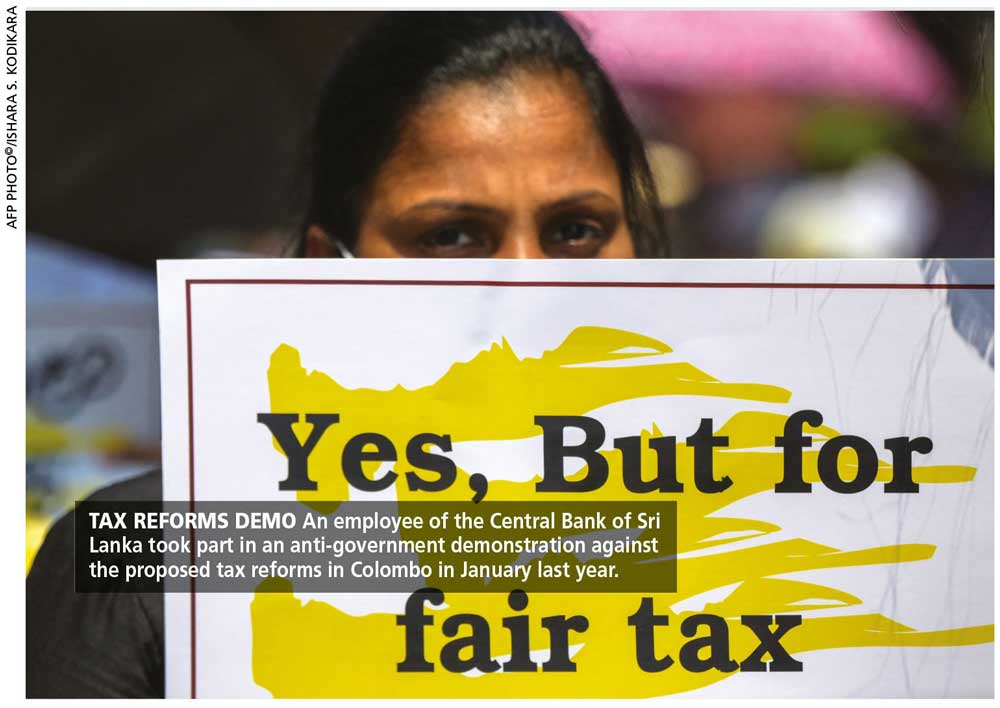THE TAX REGIME
TAXING TIMES FOR CITIZENS
Fazmina Imamudeen evaluates the implications of the recent tax increases
Parliamentary approval (which was granted on 11 December) for the increase in value added tax (VAT) from 15 to 18 percent, and the imposition of VAT on 97 essential items that were previously exempted, have ignited serious concerns among Sri Lankans.
This tax revision – primarily targeting items such as fuel, cooking gas and fertiliser – is expected to create a ripple effect on the cost of essential goods, and thereby impact the daily lives of ordinary citizens.
The increased cost of essential items also raises questions about the government’s ability to address many pressing socioeconomic challenges faced by the people.
At a time when vulnerable groups are grappling with economic hardships, the VAT hike adds another layer of complexity to their problems. As outlined in the 2024 budget speech, the rationale for the tax increase focusses on the urgent need to increase state revenue to meet Sri Lanka’s international debt repayments.
Previously, the IMF sounded a warning about a potential default on a substantial loan repayment, and this compelled the government to take tough fiscal decisions.
Increasing state revenue from 9.1 percent of GDP to 12.5 percent of gross domestic product in 2024 reflects the urgency felt by financial authorities to stabilise the country’s economy.
However, the implications of this decision extend beyond revenue figures and economic targets. The ministry of finance’s estimation that the VAT increase will raise government revenue by 56 percent is juxtaposed against the looming threat of a rise in inflation.
This is causing concern among Sri Lankans about the affordability of necessities. It is also potentially widening the economic divide and intensifying social disparities.
State Minister of Finance Shehan Semasinghe’s warning about the potential consequences of not approving the VAT hike underscores the balancing act that the government must strike between meeting its international obligations and safeguarding the wellbeing of citizens.
The approval of the second tranche of the International Monetary Fund’s Extended Fund Facility (EFF) following the tax increase sheds light on the global economic web that Sri Lanka finds itself entangled in; and it emphasises the interconnectedness of national and international financial systems.
In the midst of this continuous economic upheaval, Budget 2024 reflects a nuanced impact on the lives of ordinary Sri Lankans.
On a positive note, it allocates substantial funds to improving the wellbeing of state sector employees. Significant measures encompass a noteworthy 25 percent boost in the cost of living allowance, a monthly pension increment and the restoration of the government’s disaster loan facility.
There are also considerable improvements in social security programmes such as retroactive payments for those who are eligible, increased allowances for disabilities and kidney disease, higher monthly stipends for senior citizens and a biannual reassessment of insurance beneficiaries.
Together, these initiatives form a comprehensive strategy designed to deliver essential relief to the most vulnerable segments of society. However, the increase in the rate of VAT poses potential challenges by placing an additional strain on household budgets.
The proposed reform of the public sector, which includes a reduction of the workforce and privatisation of selected state-owned enterprises (SOE), may result in job losses and compound many existing difficulties faced by the people.
As the nation stands at this economic crossroads, it has become imperative for the government to evaluate the repercussions of its policies on Sri Lankans. Considerations for adjustments are crucial to ensuring that the advantages outlined in the budget genuinely outweigh the burdens imposed on the populace.
The fate of Sri Lankans hangs in the balance, and the decisions taken in the coming months will play a pivotal role in determining the future trajectory of the island’s economy.





